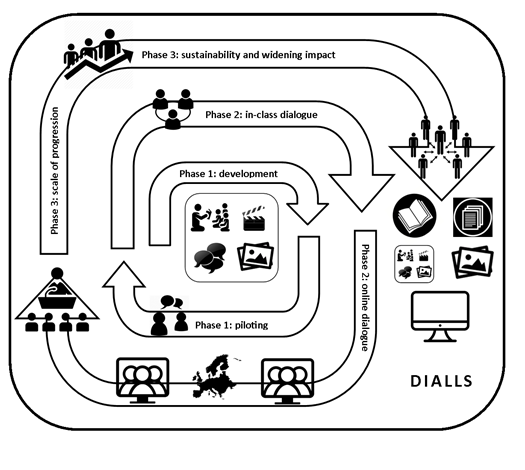
Exploring the cultural literacy learning of young people in Europe through their responses to visual texts
The plurality of voices, cultures, and identities in the current European landscape has been intensified by migration in and beyond Europe due to economic crises and refugee movement. Consequently, a homogeneous European cultural identity, is neither a reality, nor an appropriate goal for youth development. What educational research, policy-making and practice can do, however, is to support young people to develop a deep awareness and understanding of European multiculturalism and diversity of heritages, to integrate this in a pluralistic view of European identity, and to help them enact this awareness in their own dispositions and behaviours. Visit the project's website www.dialls2020.eu to find out more.
Objectives
DIALLS which runs from May 2018 until April 2021, will centralise co-constructive dialogue as a main cultural literacy value, with the aim of promoting tolerance, inclusion and empathy. It moves beyond a concept of cultural literacy as being about knowledge of culture (through exploration of literature and art for example) into a consideration of the disposition to explore different interpretations of it. It innovates by also viewing cultural literacy as enabled by the response to and creation of cultural resources, thus positioning young people as the users and producers of culture.
Project
This will be achieved through teaching children in schools from a young age to engage together in discussions where they may have differing viewpoints or perspectives, to enable a growing awareness of their own cultural identities, and those of others. DIALLS will:
- Develop an understanding of young people’s cultural literacy in formal education through the teaching of dialogue and argumentation as a means to understand European identities, cultures and diversities. This will be achieved through the creation and implementation of cultural literacy learning activities, where students respond to and produce multi-modal texts (wordless picturebooks and short films) reflecting European cultural heritage and/or positive cultural values; and through analysis of how structured interactions, both face-to-face and using an online platform, promote effective inter-cultural dialogue and mutual understanding as students co-construct meanings with their European peers.
- Provide comprehensive guidance for the development of cultural literacy in schools through the creation of a scale of progression to assess knowledge, skills and competences for pre-primary through to secondary-aged students. This will also produce a deep understanding of how civic and cultural values are manifested in students’ discourse and their production of cultural artefacts.
- Promote the emergence of young peoples' cultural identities in a student-authored manifesto for cultural literacy and a virtual gallery of their cultural artefacts.
Comparative analysis of students in and across eight European countries will highlight the potential impact of social factors including gender, socio-economic context, age, and ethnicity on how young people negotiate and construct their European identities.

The novelty of our proposal lies in our goal to establish educational face-to-face and online environments as dialogic spaces of tolerance, inclusion and empathy where students can share their perspectives and their own created cultural artefacts as they make sense of Europe and its different cultures. Our teaching and assessment tools will form the basis of guidance to support schools in their development of a dialogic pedagogy for cultural literacy in tomorrow’s Europe.
People
The DIALLS consortium comprises nine universities from across Europe and one in Israel which have close networks of partnership schools (pre-primary, primary and secondary) in a range of urban and rural contexts.
The consortium is led by Dr Fiona Maine from the Faculty of Education at the University of Cambridge. Other universities in the consortium additionally bring expertise about the implementation of large network projects, including existing online students’ dialogue platforms to be adapted for DIALLS Individuals who form the core consortium group also include those with expertise in working with teachers to develop dialogue and argumentation in schools and those with deep understanding of European cultural identities and heritages.
The consortium partners are:
- Faculty of Social Sciences and Humanities/Universidade Nova de Lisboa led by Dr Fabrizio Macagno
- Centre National de la Recherche Scientifique /Telecom ParisTech led by Dr Michael Baker
- Department of Music, Art and Culture Studies/ University of Jyväskylä, led by Dr Tuuli Lähdeskmäki
- Faculty of Psychology/University of Münster led by Prof Dr Regina Jucks
- Institute of Educational Sciences/University of Vilnius led Prof Dr Irena Zaleskiene
- Developmental and Educational Psychology Department/University of Barcelona led by Dr Merce Garcia-Mila
- Department of Education/University of Nicosia led by Dr Maria Evagorou
- School of Education/The Hebrew University of Jerusalem led by Prof Baruch Schwarz
- Institute of Educational Sciences/Humboldt University of Berlin led by Prof Dr Elisabeth Mayweg-Paus
More information:
More information can be found on the project website: www.dialls2020.eu
Contact
You can contact the DIALLS project at: www.dialls2020.eu/contact
Funding

